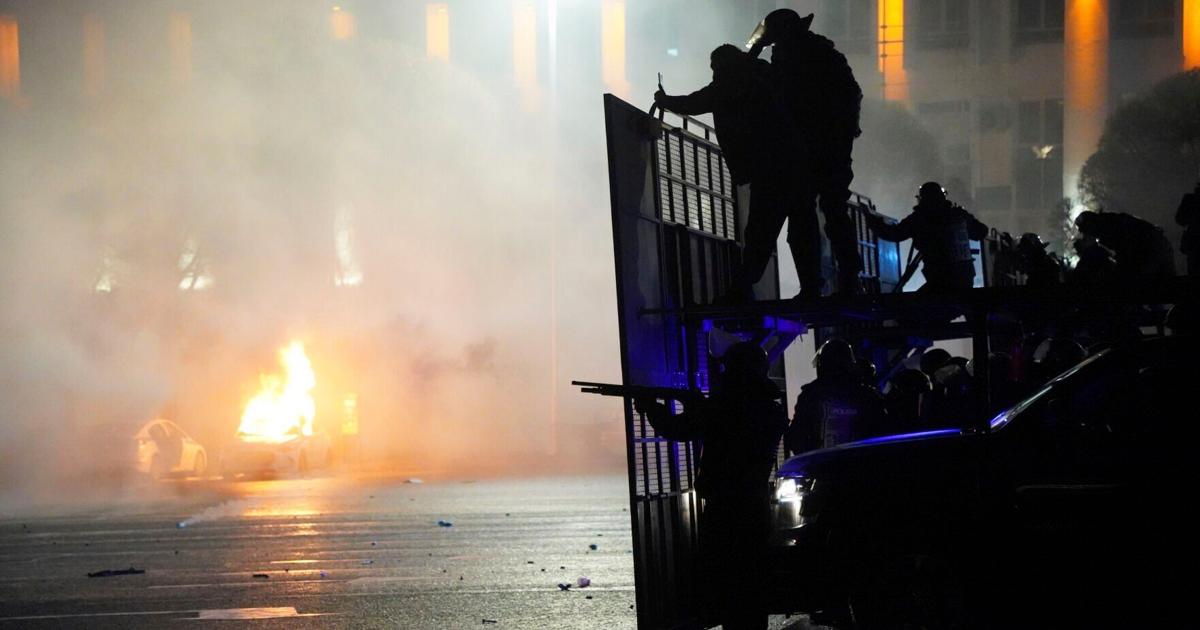
FILE – A police car on fire as riot police prepare to stop protesters in the center of Almaty, Kazakhstan, on Jan. 5, 2022. China gave strong verbal backing to Kazakhstan’s leader for his deadly crackdown to quell violent unrest, but stood aside as Russia sent in special forces troops. (AP Photo/Vladimir Tretyakov, File)
FILE – A police car on fire as riot police prepare to stop protesters in the center of Almaty, Kazakhstan, on Jan. 5, 2022. China gave strong verbal backing to Kazakhstan’s leader for his deadly crackdown to quell violent unrest, but stood aside as Russia sent in special forces troops. (AP Photo/Vladimir Tretyakov, File)
BEIJING (AP) — China gave strong verbal backing to Kazakhstan’s leader for his deadly crackdown to quell violent unrest, but stood aside as Russia sent in special forces troops.
Resource-rich Kazakhstan, on China’s western border, has economic and strategic importance for Beijing and is an important link in its “Belt and Road” infrastructure initiative to expand its global trade and political influence in rivalry with the U.S. and its allies.
China’s response to the crisis underscores how it prefers to influence outcomes with verbal assurances and offers of assistance, without committing troops.
“The growing closeness between Russia and China means we can expect more rhetorical support for Moscow’s overseas ventures, particularly when they go up against Western geostrategic aims,” said Rana Mitter, an Oxford University China expert.
“However, China remains extremely reluctant to deploy People’s Liberation Army troops outside its own territory, except in areas such as U.N. peacekeeping operations, as it would contradict its constant statements that unlike the U.S., China does not intervene in other countries’ conflicts,” Mitter said.
VERTISEMENT
___
WHAT ARE CHINA’S GOALS IN CENTRAL ASIA?
Since the demise of the Soviet Union, China has steadily expanded its economic and political influence in a region that Russia considers its own backyard. As the largest and by far the wealthiest Central Asian state, Kazakhstan is key, acting as the buckle in China’s “Belt and Road” initiative, and its authoritarian politics act as a bulwark against democratic movements in Ukraine and elsewhere that China derides as Western-engineered “color revolutions.”
China’s ruling Communist Party, which violently repressed its own pro-democracy challenge in 1989, views such movements, whether in Georgia or Hong Kong, as a threat to its own stability. In a message to Kazakh President Kassym-Jomart Tokayev amid the unrest, Chinese leader Xi Jinping said his country would “resolutely oppose external forces deliberately creating turmoil and instigating a ‘color revolution’ in Kazakhstan.”
China’s position dovetails with its strident opposition to outside criticism of its policies, whether its human rights record or its expansive territorial claims in the South China Sea, as meddling in its internal affairs.
China’s influence in Central Asia still has limits, however, and Kazakhstan may feel uneasy about inviting in Chinese troops, given China’s harsh treatment of ethnic Kazakhs and other Muslim minorities within its borders, said Steve Tsang, director of the China Institute at the University of London’s School of Oriental and African Studies.
“An important element of China’s foreign policy under Xi is to make the world safe for authoritarian states and stop color revolutions from spreading,” Tsang said.
___
WHEN DOES CHINA INTERVENE?
VERTISEMENT
China frequently vows retaliation for any criticism of its policies, especially when the offenders are the U.S. and its allies. It is far friendlier with autocrats, pledging non-interference and cooperation with whomever is in power, regardless of their records on human rights and corruption.
That’s evidenced in its dealings with regimes that others criticize, from Myanmar’s military leaders to Hungary’s Viktor Orban. While not recognizing the Taliban, it is hedging its bets in Afghanistan by working with the country’s current rulers, despite their espousal of the form of radical Islam that Beijing has sought to keep from infiltrating its restive, largely Muslim region of Xinjiang, which shares a narrow border with Afghanistan and a much larger one with Kazakhstan.
China generally reserves action, military and otherwise, for cases in which its own security is perceived as threatened, as in the 1950-53 Korean War, or more recently, in violent incidents along its disputed border with India, and especially with Taiwan, which China threatens to invade if it doesn’t agree to unite. Beijing responded with ruthless trade and diplomatic retaliation against Lithuania when the tiny Baltic nation broke with diplomatic convention by allowing Taiwan to open a representative office in Vilnius under the name “Taiwan” instead of “Chinese Taipei.”
___
HOW DOES CHINA VIEW MILITARY ALLIANCES?
Troops, mostly from Russia, were deployed to Kazakhstan last week by the Collective Security Treaty Organization , a grouping of six former Soviet states, at the president’s request amid unprecedented violence. China officially eschews such security alliances, although The Shanghai Cooperation Organization, which Beijing dominates along with Moscow, has a security component, currently limited to joint training and other non-combat missions.
Unlike the CSTO, there is “no agreement about sending troops from member countries of the SCO,” Chinese international security expert Li Wei said. “In addition, China sticks to the fundamental principle of not using force in other countries.”
U.N. Peacekeeping Operations remain the rare exception, and China is quick to point out that it is the largest contributor of forces to such missions among the five permanent members of the U.N. Security Council.
Given the growing might of China’s military, some experts expect Beijing to become more amenable to military interventions in the future. Oxford’s Mitter also points to a growing “grey zone” of Chinese private security enterprises that can be used to protect Chinese interests “without any formal government intervention.”








